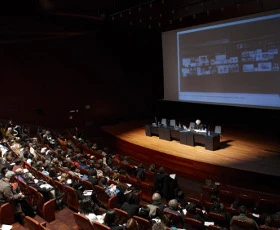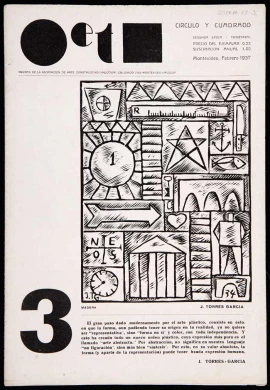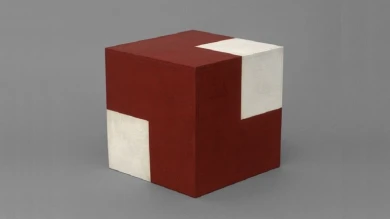Call for Papers
Transatlantic Encounters: avant-garde discourses in Spain and Latin America

Held on 28 Feb 2013
The international conference Transatlantic Encounters: avant-garde discourses in Spain and Latin America (July 11-13, 2013) looks into the artistic and intellectual dialogue between Spain and Latin America during the 20th century. It forms part of Museo Reina Sofía’s mission to become a platform for the study and dissemination of Latin American art in Europe. The conference has been planned to coincide with the exhibition Concrete Invention: Colección Patricia Phelps de Cisneros (Museo Reina Sofía, January 23 – September 16, 2013). The studies and debates here proposed thus help rethink dominant historiographies of modernism and modernity – a revisionist undertaking that has been promoted by Museo Reina Sofía through its exhibitions, public programs and publications.
A growing interest in the study of modern art from Latin America has helped question the legacy of Modernism, and the way in which the formalist canon has legitimised boundaries between centre and periphery. The relationship between the avant-gardes and Modernism has been a complex history of competing narratives that continue to debate the political and aesthetic agendas of the avant-garde. Resisting absorption into the Modernist canon, championed by Greenberg’s notion of ‘self-criticism’, many avant-garde practices in Spain and Latin America were fuelled by utopian desires to create a new society through the agency of art. Their experimentation gave rise to innovative and radical practices which have helped to revise dominant historiographies of modern art. Many of these works were the result of transatlantic encounters between artists, critics and curators working from these two geopolitical spheres.
Rather than looking at specific movements, this conference aims to explore the notion of the avant-garde as it relates to the experience of modernity, and the way in which a political and aesthetic vanguardiawas shaped by post-war art and politics between 1920 and 1970. The specific nature of avant-garde and neo avant-garde practices, and the way in which transnational dialogue helped to delineate artistic discourses in Spain and Latin America, will be the reflections underlying this event. Through keynote speakers and papers, the different sessions will highlight the most recent research, thus contributing to a better understanding of Modernism from a transnational perspective.
The following lines of research serve as transversal themes underlying the four sessions:
- The way in which the concept of national avant-gardes in Latin America and Spain challenged the cosmopolitan nature of vanguardismo– thereby manifesting the complexities of avant-garde projects outside the main cosmopolitan centres of New York and Paris.
- The complex negotiation between history and modernity, originality and tradition.
- The way in which the utopian projects of the historical avant-gardes transformed and adapted to the socio-political problems of Spain and Latin America in the 50s, 60s and 70s.
- The artistic and intellectual exchange between Spain and Latin America during the first half of the 20th century.
- The relationships between artists and critics in the articulation of an aesthetic and political avant-garde, and the mechanisms of representation and display that responded to them.
The papers will be divided among the following sessions. Please specify in your abstract the session with which your proposal best corresponds.
Session 1: Encounters between Spain and Latin America
Session one explores the new routes of exchange that bypass the Paris-New York axis, thus creating new cartographies and journeys that highlight exchanges between avant-garde movements that have not been sufficiently considered by current historiography.
Session 2: Museography, representation and curatorial narratives
Aborda la importancia de los relatos museográficos en la divulgación de proyectos vanguardistas entre 1920 y 1970, así como los mecanismos expositivos y “construcciones” curatoriales que sobre las mismas se están ofreciendo actualmente tanto en espacios públicos, como alternativos.Session two addresses the significance of museography and exhibitions in the dissemination or institutionalisation of avant-garde projects between 1920 and 1970, as well as current curatorial narratives and display mechanisms that offer revisionist readings of this period.
Session 3: Genealogies and avant-garde discourses
TWith the study of artistic practices as its point of departure, session three analyses the role of art criticism and theory in the construction of avant-garde discourses. It seeks to establish a genealogy of practices, vocabularies and concepts that reflect the particularities of avant-garde production in Spain and Latin America.
Session 4: Modernity and modernism(s): discrepancies and displacements
Session four focuses on the legacy of the modernist canon and formalism as discourses that have helped legitimise the boundaries between centre and periphery. Considering concepts like ‘margins, periphery, alterity and divergence’ this session seeks to reveal the fissures present in a complex geopolitical map.
Organised by
History Institute of CSIC; Department of Arts and Humanities at Saint Louis University Madrid; Colección Patricia Phelps de Cisneros and Museo Reina Sofía
Submission details
Proposals must consist of a 500 word abstract and CV (two pages maximum). Please send to Paula Barreiro López paula.barreiro@cchs.csic.es.
The official language of the conference will be Spanish but papers in English will also be accepted.
The results will be made known on the 25th of March.
If the proposal is accepted participants may request financial aid to help cover the cost of travel and accommodation. Due to limited funds, participants requesting aid must justify that no other sources of funding are available.
Participants
Paula Barreiro López. History Institute at the Human and Social Sciences Centre, CSIC (Spanish National Research Council)
Jesús María Carrillo Castillo. Museo Reina Sofía
Fabiola Martínez Rodríguez. Saint Louis University Madrid
Gabriel Pérez Barreiro. Colección Patricia Phelps de Cisneros
Más actividades

Aesthetics of Peace and Desertion Tactics
8 October 2025 – 24 June 2026
The study group Aesthetics of Peace and Tactics of Desertion: Prefiguring New Pacifisms and Forms of Transitional Justice proposes a rethinking—through both a theoretical-critical and historical-artistic lens—of the intricate network of concepts and practices operating under the notion of pacifism. A term not without contestation and critical tension, pacifism gathers under its name a multiplicity of practices—from anti-militarism and anti-war movements to non-violence activism—while simultaneously opening urgent debates around violence, justice, reparation, and desertion. Here, pacifism is not conceived as a moral doctrine, but as an active form of ethical and political resistance capable of generating aesthetic languages and new positions of social imagination.
Through collective study, the group seeks to update critical debates surrounding the use of violence and non-violence, as well as to explore the conflict of their representation at the core of visual cultures. In a present marked by rearmament, war, genocide, and the collapse of the social contract, this group aims to equip itself with tools to, on one hand, map genealogies and aesthetics of peace—within and beyond the Spanish context—and, on the other, analyze strategies of pacification that have served to neutralize the critical power of peace struggles. Transitional and anti-punitive justice proposals will also be addressed, alongside their intersections with artistic, visual, and cinematic practices. This includes examining historical examples of tribunals and paralegal activisms initiated by artists, and projects where gestures, imaginaries, and vocabularies tied to justice, reparation, memory, and mourning are developed.
It is also crucial to note that the study programme is grounded in ongoing reflection around tactics and concepts drawn, among others, from contemporary and radical Black thought—such as flight, exodus, abolitionism, desertion, and refusal. In other words, strategies and ideas that articulate ways of withdrawing from the mandates of institutions or violent paradigms that must be abandoned or dismantled. From feminist, internationalist, and decolonial perspectives, these concepts have nourished cultural coalitions and positions whose recovery today is urgent in order to prefigure a new pacifism: generative, transformative, and radical.
Aesthetics of Peace and Tactics of Desertion, developed and led by the Museo Reina Sofía’s Studies Management, unfolds through biweekly sessions from October to June. These sessions alternate between theoretical discussions, screenings, work with artworks and archival materials from the Museo’s Collection, reading workshops, and public sessions. The group is structured around sustained methodologies of study, close reading, and collective discussion of thinkers such as Judith Butler, Elsa Dorlin, Juan Albarrán, Rita Segato, Sven Lütticken, Ruth Wilson Gilmore, and Franco “Bifo” Berardi; historical episodes such as the anti-nuclear and anti-arms race movement in Spain; and the work of artists and activists including Rojava Film Commune, Manuel Correa and the Oficina de Investigación Documental (Office for Documentary Investigation), and Jonas Staal, among other initial cases that will expand as the group progresses.

Institutional Decentralisation
Thursday, 21 May 2026 – 5:30pm
This series is organised by equipoMotor, a group of teenagers, young people and older people who have participated in the Museo Reina Sofía’s previous community education projects, and is structured around four themed blocks that pivot on the monstrous.
This fourth and final session centres on films that take the museum away from its axis and make it gaze from the edges. Pieces that work with that which is normally left out: peripheral territories, unpolished aesthetics, clumsy gestures full of intent. Instead of possessing an institutional lustre, here they are rough, precarious and strange in appearance, legitimate forms of making and showing culture. The idea is to think about what happens when central authority is displaced, when the ugly and the uncomfortable are not hidden, when they are recognised as part of the commons. Film that does not seek to be to one’s liking, but to open space and allow other ways of seeing and inhabiting the museum to enter stage.

Intergenerationality
Thursday, 9 April 2026 – 5:30pm
This series is organised by equipoMotor, a group of teenagers, young people and older people who have participated in the Museo Reina Sofía’s previous community education projects, and is structured around four themed blocks that pivot on the monstrous.
The third session gazes at film as a place from which to dismantle the idea of one sole history and one sole time. From a decolonial and queer perspective, it explores films which break the straight line of past-present-future, which mix memories, slow progress and leave space for rhythms which customarily make no room for official accounts. Here the images open cracks through which bodies, voices and affects appear, disrupting archive and questioning who narrates, and from where and for whom. The proposal is at once simple and ambitious: use film to imagine other modes of remembering, belonging and projecting futures we have not yet been able to live.

Remedios Zafra
Thursday March 19, 2026 - 19:00 h
The José Luis Brea Chair, dedicated to reflecting on the image and the epistemology of visuality in contemporary culture, opens its program with an inaugural lecture by essayist and thinker Remedios Zafra.
“That the contemporary antifeminist upsurge is constructed as an anti-intellectual drive is no coincidence; the two feed into one another. To advance a reactionary discourse that defends inequality, it is necessary to challenge gender studies and gender-equality policies, but also to devalue the very foundations of knowledge in which these have been most intensely developed over recent decades—while also undermining their institutional support: universities, art and research centers, and academic culture.
Feminism has been deeply linked to the affirmation of the most committed humanist thought. Periods of enlightenment and moments of transition toward more just social forms—sustained by education—have been when feminist demands have emerged most strongly. Awareness and achievements in equality increase when education plays a leading social role; thus, devaluing intellectual work also contributes to harming feminism, and vice versa, insofar as the bond between knowledge and feminism is not only conceptual and historical, but also intimate and political.
Today, antifeminism is used globally as the symbolic adhesive of far-right movements, in parallel with the devaluation of forms of knowledge emerging from the university and from science—mistreated by hoaxes and disinformation on social networks and through the spectacularization of life mediated by screens. These are consequences bound up with the primacy of a scopic value that for some time has been denigrating thought and positioning what is most seen as what is most valuable within the normalized mediation of technology. This inertia coexists with techno-libertarian proclamations that reactivate a patriarchy that uses the resentment of many men as a seductive and cohesive force to preserve and inflame privileges in the new world as techno-scenario.
This lecture will address this epochal context, delving into the synchronicity of these upsurges through an additional parallel between forms of patriarchal domination and techno-labor domination. A parallel in which feminism and intellectual work are both being harmed, while also sending signals that in both lie emancipatory responses to today’s reactionary turns and the neutralization of critique. This consonance would also speak to how the perverse patriarchal basis that turns women into sustainers of their own subordination finds its equivalent in the encouraged self-exploitation of cultural workers; in the legitimation of affective capital and symbolic capital as sufficient forms of payment; in the blurring of boundaries between life and work and in domestic isolation; or in the pressure to please and comply as an extended patriarchal form—today linked to the feigned enthusiasm of precarious workers, but also to technological adulation. In response to possible resistance and intellectual action, patriarchy has associated feminists with a future foretold as unhappy for them, equating “thought and consciousness” with unhappiness—where these have in fact been (and continue to be) levers of autonomy and emancipation.”
— Remedios Zafra

27th Contemporary Art Conservation Conference
Wednesday, 4, and Thursday, 5 March 2026
The 27th Contemporary Art Conservation Conference, organised by the Museo Reina Sofía’s Department of Conservation and Restoration, with the sponsorship of the Mapfre Foundation, is held on 4 and 5 March 2026. This international encounter sets out to share and debate experience and research, open new channels of study and reflect on conservation and the professional practice of restorers.
This edition will be held with in-person and online attendance formats, occurring simultaneously, via twenty-minute interventions followed by a five-minute Q&A.

